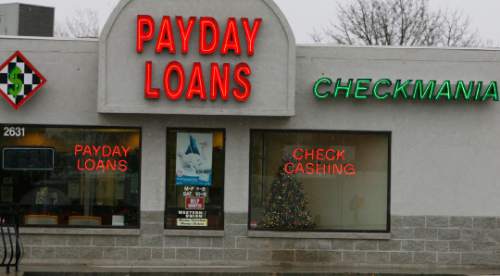This is an archived article that was published on sltrib.com in 2015, and information in the article may be outdated. It is provided only for personal research purposes and may not be reprinted.
[Video: OK. Not exactly a Christmas carol. But it fits. And this video about a Hotel California seems to have lots of Utah in it.]
This Christmas Eve, chances are high that, not far from where you are sitting all cozy and warm, a young woman on the verge of giving birth and her devoted fiancé are lost and alone, searching for a place to stay.
In the urban areas of Utah, the inns may be full or, for many, their prices out of reach. Stables and mangers, meanwhile, are in short supply.
So, instead of taking refuge among oxen, sheep and the odd drummer boy, our Joe and Mary may find themselves at the door of one of the growing number of payday-lending operations that have proliferated in this state. There, perhaps in exchange for nothing more than a signature on a promissory note, the new family may get the cash they need for a few nights in a motel, or even a deposit on a small apartment.
It might seem to them like the perfect Christmas gift. But it won't have come from three wise men. And, if they don't pay the loan back soon, with exorbitant interest charges, it will be more like dealing with a less violent version of the mob's wiseguys. People who don't break your kneecaps with a hammer, but ruin your finances with a lawsuit.
Instead of the Inn in Bethlehem, it becomes the Hotel California. You can check out any time you want, but you can never leave.
Utahns of modest means are increasingly trapped in spirals of debts and threats by payday lending operations that charge annual interest rates upwards of 500 percent.
The whole scam is based on the idea that those drawn to such loans in the first place are not likely to be able to repay them on the promised schedule. So they take out a second loan to repay the first. And a third to repay the second. And so on, mounting up interest charges and late fees, until they sink into total bankruptcy and are dragged into court by the lender or lenders who willfully helped them into the predicament in the first place.
Research by The Salt Lake Tribune shows that nearly 8,000 such lawsuits were filed in Utah courts for the fiscal year ending June 30, 2015. The caseload is swamping some municipal justice courts.
Members of the Utah Legislature have attempted to put limits on interest rates, collection tactics and other excesses of payday and signature loan operations. Which is difficult, given how much money the legal loan sharks pour into lobbying and campaign donations and how easy it is to get around laws that are aimed at specific kinds of financial transactions by inventing a new kind.
Laws that put firm ceilings on interest rates, as other states have done, would probably be the most help. But eternal vigilance will be necessary to protect the most financially fragile among us from these predatory lenders.
Which means — yes, Virginia — that we will probably be able to run this editorial on Christmas Eve every year.



